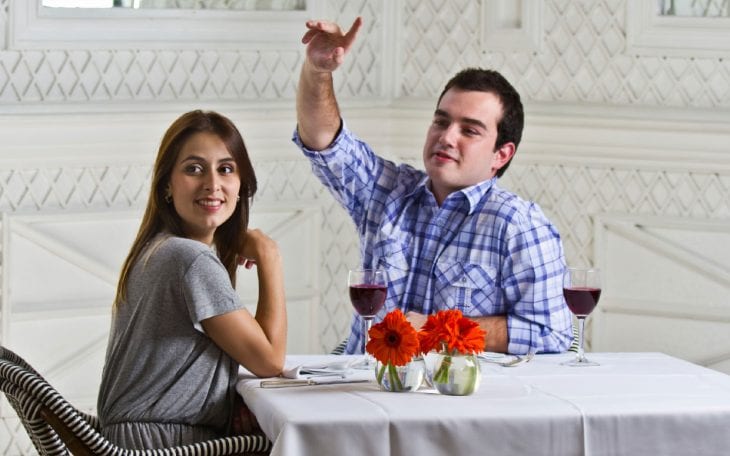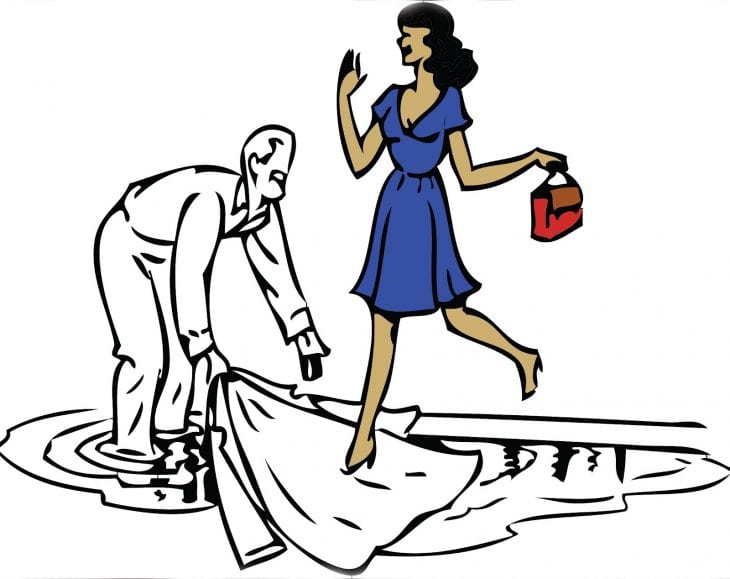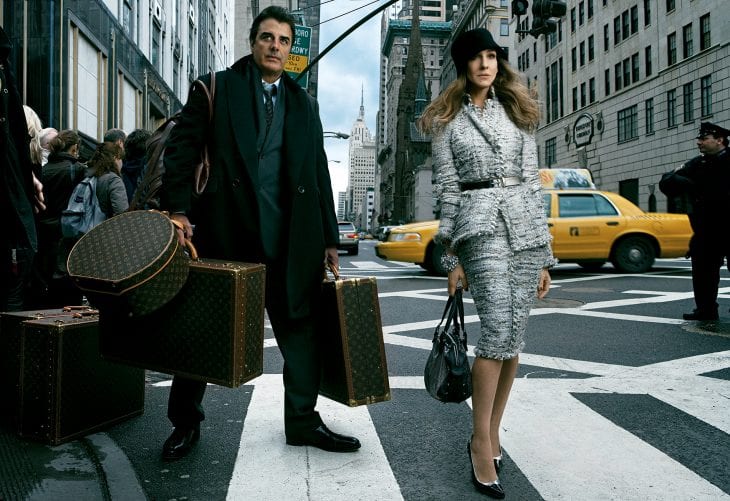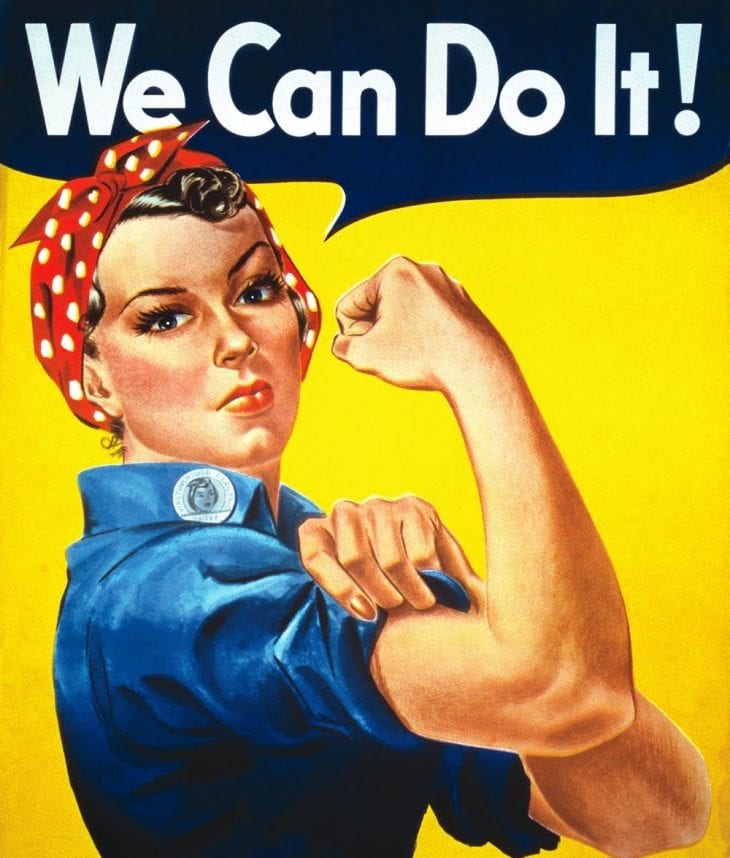My freshman year of college, I went on a date with a guy to a fancy restaurant in Manhattan. It was the kind of place with a white tablecloth, where a busboy scraped the crumbs off the table with a comb once your plates were removed and the maitre’d pulled out women’s chairs for them. That’s where I made my big statement: the maitre’d pulled out a chair for me and I walked around to the other chair, pulled it out for myself and sat down. I wasn’t just being rude; I thought I was making a point about how I — and by extension all women — didn’t need to be treated with chivalry.
Throughout my young adult life as I was forming my feminist political beliefs, I felt weird about men treating me “differently.” Frankly, it seemed anti-egalitarian to me. I had worked at after-school jobs earning my own money since I was 14. Why would I expect men to pay for me on dates?

Source: Parade
Some people say chivalry is just the same as having manners, which means by definition any person who has manners is chivalrous. I disagree; I think there’s a reason there are two separate words with two separate definitions. Having manners is about treating others with courtesy because it makes life more pleasant and because you believe in the golden rule (“treat others the way you would want to be treated”). Chivalry involves more than just being baseline courteous. Chivalry is a special code of behavior that one partner has for the other partner, but not vice versa. Although chivalry involves manners, really, it has to do with gender roles.
I was raised with parents who have some old-fashioned values, including good manners. (My mom actually collects etiquette books.) Neither of my parents ever said anything explicit about being treated chivalrously by guys when I started dating in high school. My dad treats me, my mom, my sisters and other women with chivalry, and always has. He holds open doors for us. He lifts heavy boxes. He shovels snow. He kills spiders. (Well, that may have less to do with chivalry than it does with me being a huge wuss.) I must have noticed my dad’s chivalrous behavior growing up, but I guess I just wrote it off as more of their “old-fashioned values” that weren’t relevant to me. My mom had said some stuff to me as a teen about not having sex until marriage, not being slutty, and abortion killing a baby. Even at 15 or 16, I knew I didn’t agree with those beliefs and I just kind of wrote off everything that she, and they, said or did regarding anything as “out of touch.”

Source: Washington Examiner
Maybe because chivalry seemed like an old-fashioned concept to me, it made me viscerally uncomfortable. Throughout my young adult life as I was forming my feminist political beliefs, I felt weird about men treating me “differently.” Frankly, it seemed anti-egalitarian to me. I had worked at after-school jobs earning my own money since I was 14. Why would I expect men to pay for me on dates? I’m able-bodied, so why would I need a man to hold open a door for me or carry heavy things or change the tire on my car? Is doing something for me that I can do myself just a ploy to get into my pants? And it’s the 21st century — do I really need to “let a guy call first” and play hard to get? Some of that discomfort may have been posturing and proving to myself that I’m strong, not weak. But honestly, much of it came from a genuine, deep-down confusion about 21st century gender roles.
And no wonder I was confused! Living in Manhattan during college and after college would make even the most chivalry-loving women have to get her hands dirty. Unless you’re wealthy and can afford to take cabs everywhere (or do FreshDirect all the time), you carry your groceries home and up your stairs. And you probably live in a sixth-floor walkup! You jump over your own puddles and hail your own cabs. When some weirdo on the subway whips out his penis in front of you, you have to be the one to raise a holy hell. Hulk Hogan is not going to lug your new couch up the stairs, nor is Superman going to show up and defend your honor. Sometimes I would make a joke to my friends that “New York City is where chivalry goes to die.”

Source: With Hugs
Something started happening, though: I saw other men treating their girlfriends and wives chivalrously and I envied those women. It looked to me like their men really cared about them, so much so that they were doing something supernumerary. As time went on, I occasionally dated men who behaved chivalrously, though usually I felt like it was just a front —“I’m trying to make a good impression” behavior. Then I had one boyfriend who was an Upper East Side prep school-type and treating women chivalrously seems to have been bred into him. There were times I liked his chivalry, but there were times I pushed up against it, too, because it still made me feel uncomfortable. It wasn’t until I started dating Mr. Jessica that I consciously decided to ignore my discomfort—to push my natural fuss-making instincts to the side—and let the poor guy treat me how he felt. In Mr. Jessica’s case, was chivalrously.
And that’s when I learned that I really, really enjoyed it.

Source: gustum – WordPress.com
Mr. Jessica paid on our first few dates and though we in time split expenses 50/50 and always evenly split the rent, he nearly always paid when we had “date night.” He always opened the driver’s side door for me. He always held doors open for me. With the exception of the times his back was hurting him, he always carried the heaviest groceries and boxes up the three flights to our apartment building. And a couple of times in restaurants he got really fancy and pulled out the chair for me.
For the first time in my life, I genuinely liked how chivalry made me feel: valued as someone worthy of his extra-special attention, taken care of, to an extent, and even a little bit “ladylike,” whatever that means. Maybe it’s because my relationship with Mr. Jessica was the first long-term, very serious one that I had been in, but his chivalry never made me feel like he thought I was weak or that it was a “front” to get in my pants. It felt like he treated me chivalrously because he cared about me. Perhaps for me, trust is a big element for appreciating chivalry.

Source: The way Lauren explores life…
Of course, being treated chivalrously isn’t a guarantee that you will always be treated well, as our breakup attests. But I cherished the day-to-day feeling that he cared about me and that he was putting an effort into treating me nicely, beyond just having the basic manners of not chewing with his mouth open or interrupting someone when they were speaking. Just like I have a hard time reconciling my feminist beliefs with my desire to be with a more dominant, alpha male, I also have a hard time reconciling my feminist beliefs with my enjoyment of chivalry. I am now figuring out that the two are not mutually exclusive.
Original by: Jessica Wakeman
